

Financial inclusion: the rising billions. The first and leading Finance 2.0 & FinTech conference in Switzerland. Financial inclusion: the rising billions. Why Disruptive Change Points to a New Humanism in Banking. Many use the term “disruption” to describe the upheaval we’re seeing in the financial services industry.

But I believe we are witnessing a “phase-change”—a deeper transformation of how banking and business in general are done, caused by the fragmentation of everything and an unprecedented and unsurpassed period of evolutionary innovation-—what might be called a “Cambrian explosion.” In the run-up to Techonomy 2012, I contributed an article entitled “The Six Ways Organizations Can Survive Until 2100.”
Six months later, my essays “Dystopian Futures” and “Drowning In Data, Banks Must Learn To Surf” elaborated on my thinking. Charles Eisenstein. Home - Ascent of Humanity. Collaborative Economy: Industry Stats. Economics of Money and Banking, Part One. The Visionary Commons. We’ve been enculturated to think of economics as a cold, boring, academic subject devoid of connection to humanity’s heart and soul.
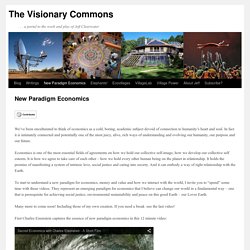
In fact it is intimately connected and potentially one of the most juicy, alive, rich ways of understanding and evolving our humanity, our purpose and our future. Economics is one of the most essential fields of agreements on how we hold our collective self-image, how we develop our collective self esteem. CURRENCY REGULATION. NEW CURRENCY. The End of Money. Christodoulos Panayiotou, 2008, (2008) Shredded money 600 (diameter) x 240 (height) cm Courtesy of the artist & Rodeo Gallery, Istanbul Installation photo Witte de With 2011: Bob Goedewaagen Opening: Saturday 21 May 2011 (6 – 9 pm) Performance by Goldin+Senneby at 7 pm Film Screening: Sunday 26 June 2011 (12 – 6 pm)
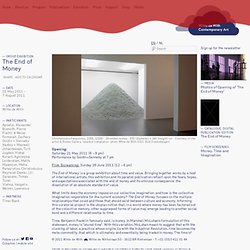
The End of Money: Counterfeiters, Preachers, Techies Dreamers. Excerpted from Chapter One: The Missionary, from The End of Money: Counterfeiters, Preachers, Techies Dreamers—and the Coming Cashless Society by David Wolman.
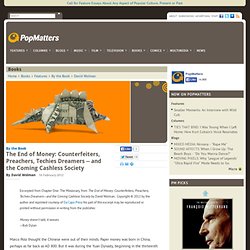
Copyright © 2012 by the author and reprinted courtesy of Da Capo Press No part of this excerpt may be reproduced or printed without permission in writing from the publisher.Money doesn’t talk, it swears. —Bob Dylan Marco Polo thought the Chinese were out of their minds. Paper money was born in China, perhaps as far back as AD 800. The Occupy Money Cooperative. ThinkSpace (_ThinkSpace_) Loft Finance - Company website. Finance 2.0 Book Roadshow: Innovation in Finance If you're new here, you may want to subscribe to the RSS feed.
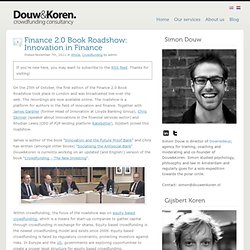
Thanks for visiting! On the 25th of October, the first edition of the Finance 2.0 Book Roadshow took place in London and was broadcasted live over the web. The recordings are now available online. The roadshow is a platform for authors in the field of innovation and finance. Together with James Gardner (former Head of Innovation at Lloyds Banking Group), Chris Skinner (speaker about innovations in the financial services sector) and Rhydian Lewis (CEO of P2P lending platform RateSetter), Gijsbert joined this roadshow. James is author of the book “Innovation and the Future Proof Bank” and Chris has written (amongst other books) “Socialising the Antisocial Bank“. Within crowdfunding, the focus of the roadshow was on equity based crowdfunding, which is a means for start-up companies to gather capital through crowdfunding in exchange for shares.
The global market for equity based crowdfunding is still very small. The Problem / Follow the Money - Investigate any major sector of human activity and you will discover the same people are in control, benefitting financially, literally making out like bandits. Investigate any major sector of human activity and you will discover the same people are in control, benefitting financially, literally making out like bandits. Check it out for yourself. By getting a clearer picture of the hidden economic incentives that are driving this unseen robbery, we can create more effective solutions to the problems facing humanity.
To learn more about the different levels of the Follow the Money pyramid, click here. About - Slow Money. The Slow Money Alliance is a national network and a family of local networks, organized around: The Slow Money Principles New ways of thinking about the relationship between food, money and soil; Regional EventsSlow Money Institutes, local discussion groups and entrepreneur showcases organized by Slow Money chapters;National GatheringsAnnual events that bring together investors, donors, entrepreneurs, activists and farmers from around the country and the world; and, Financial Products and ServicesIncubating new vehicles to make it easier for individuals of all economic backgrounds to participate, including the first of these to launch, The Soil Trust.
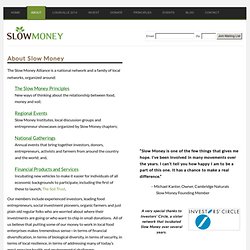
Our members include experienced investors, leading food entrepreneurs, social investment pioneers, organic farmers and just plain old regular folks who are worried about where their investments are going or who want to chip in small donations. “Slow Money is critical to the future of social investing.” Internet Financial EXchange (IFEX) Currency Fair: the P2P Marketplace to Exchange Currency on your Terms [INTERVIEW] NextGFI (nextgfi) » BarCampBank London 5 Aden Davies. The 6th of February was the date for the 5th BarCampBank London.
Held at the same loation as last years, Nesta, it brought together around a hundred or so financial service innovation types to discuss the hot topics of the moment. Last year there had been a focus on alternative currencies and economies this year they were largely absent from the sessions (the ones I attended anyway). Economic Crisis Currency Strategies and Solutions. Bank To The Future - Grand Opening Page. Stake Ventures. Money cultures Symposium. Designobjekte prägen unsere Geldkulturen auf spezifische Art und Weise.
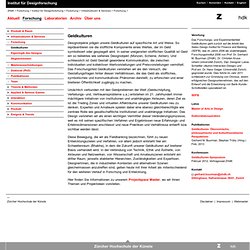
So repräsentieren sie die stoffliche Komponente eines Wertes, der im Geld symbolisiert oder gespiegelt wird. In seiner ureigensten stofflichen Qualität ist Geld ein so beliebtes wie seltenes Designobjekt (Münzen, Scheine, Aktien). Und schliesslich ist Geld Gestalt gewordene Kommunikation, die zwischen individuellen und kollektiven Wertvorstellungen und Preisvorstellungen vermittelt. Das Forschungsfeld Geldkulturen verstehen wir als den Versuch, die Gestaltungsfragen hinter diesen Verhältnissen, die das Geld als stoffliches, symbolisches und kommunikatives Phänomen darstellt, zu erforschen und einer breiteren Öffentlichkeit zugängig zu machen. Ursächlich verbunden mit den Geldproblemen der Welt (Geldschöpfung, Verteilungs- und, Vertrauensprobleme u.a.) entstehen im 21. Hier finden Sie Informationen zu unserem Projectspace Master, wo wir Ihnen Themen und Projektideen vorstellen.
PayDivvy (paydivvy) Banking / Finance 2.0: "The Internet will change the financial world in the years to fundamentally" Das Internet erweckt oft den Anschein, bereits alle Bereiche unseres Lebens durchdrungen und revolutioniert zu haben. Mag dies für viele Bereiche zutreffen, beharrt jedoch kaum ein Sektor so sehr auf veralteten Werten wie das Banken- und Finanzwesen. Amiando-Mitgründer Marc P. Bernegger hat es sich als Partner der gelisteten Schweizer Beteiligungsgesellschaft Next Generation Finance Invest ( www.nextgfi.com ) zur Aufgabe gemacht, genau daran etwas zu ändern. Ein Interview über Finance 2.0, Banking 2.0 und die aufstrebende Schweizer Startuplandschaft. Links to Metacurrency Resources. Open money. Webisteme. This is my second post on defining a trust metric for Ripple, or in fact any peer-to-peer credit network which relies solely on trust.
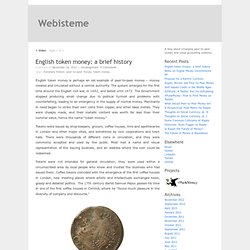
In my last post, I looked at a simple approach based on measuring the average ratio of credits and debts for a user. While this wasn’t a bad start to thinking about the problem of trust in general, it suffered from being too simple (I’ll explain why.) In this post, I want to explore a new approach suggested in a comment by Jordan Greenhall, based on measuring trust as a perspectival, probabilistic calculation rather than an inherent property of a node. First, let’s revisit the reasons why a trust metric is so critical for any peer-based credit network like Ripple to scale.
Background Ripple is a system to create money out of credit relationships between peers, rather than between individuals and banking institutions, or the state. This sets the context for why Ripple needs a trust metric. Trust as Credit Ratio. Main / HomePage. The Future of Business, shared by @gleonhard. The Future of Money: It’s Flexible, Frictionless and (Almost) Free. Cash in the clouds—neither paper nor plastic.Illustration: Aegir Hallmundur; Benjamin Franklin: Corbis A simple typo gave Michael Ivey the idea for his company.
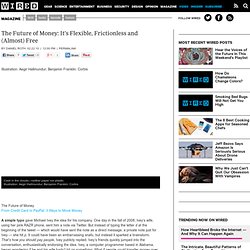
Future of Money: New Lenses of Wealth. The Future of Money: It’s Flexible, Frictionless and (Almost) Free. Re-inventing finance at Lift12. Last Thursday I had the great privilege of having been invited by the remarkable Laurent Haug to present a snapshot of our vision of the new emerging universe of “digitally native finance” at the wonderful Lift12 conference in Geneva.
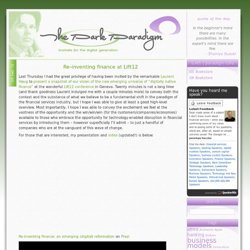
Twenty minutes is not a long time (and thank goodness Laurent indulged me with a couple minutes more) to convey both the context and the substance of what we believe to be a fundamental shift in the paradigm of the financial services industry, but I hope I was able to give at least a good high-level overview. Christophe Langlois (visible_banking) Displaying items by tag: Empty. WISERBANKS make more $$ to invest more in social projects || WiserBanks TV : Live Editors' Picks Gurus, Opinions & Nuances Financial Crisis Hard Selling Scenes.
Cash Mobs. Cash mob. Money...